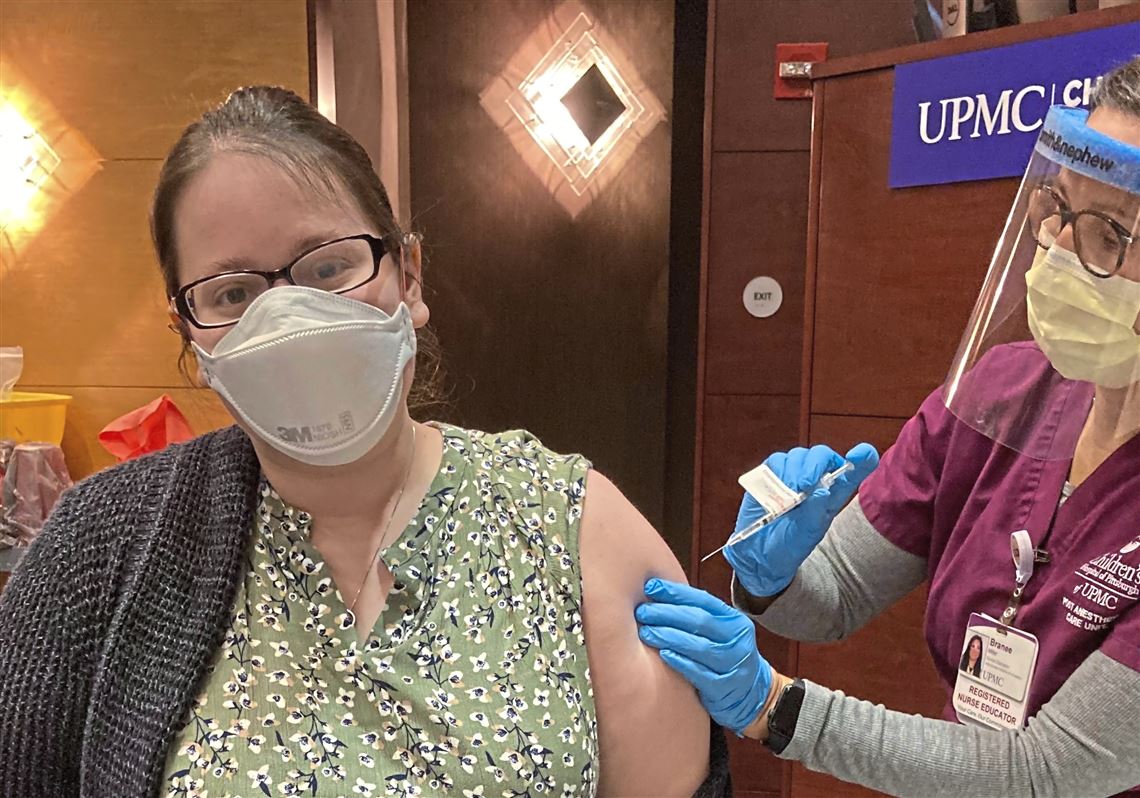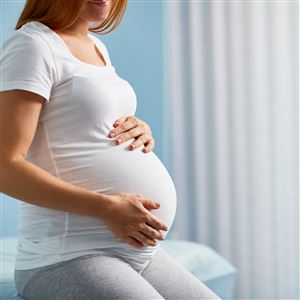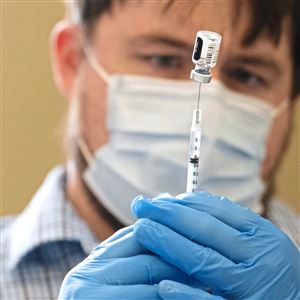As interim manager of the COVID step-down unit at West Penn Hospital, nurse Christine Fabrizio has daily exposure to COVID-19 patients. She is in frequent contact with her 70-year-old mother, who is the primary caregiver for her 3-year-old daughter. And Ms. Fabrizio is pregnant — due in May with her second child.
Ms. Fabrizio, who is now fully vaccinated, in consultation with her doctors, is thankful that she was able to get the COVID-19 vaccine.
“I was really worried that I was going to be excluded,” she said. “Knowing my own personal risk and my constant risk of exposure, it was safer to get the vaccine than not.”
For pregnant patients with less exposure and risk — who became eligible on Jan. 19 to get vaccinated in Pennsylvania as part of Phase 1A — the decision can be more confusing. Unlike members of other eligible groups, pregnant people were never officially tested with the vaccines, and there is little data on the vaccines’ safety or efficacy specific to pregnancy.
Pregnant patients also have faced conflicting and changing recommendations. Two of the vaccines are approved for use in the U.S. for those who are pregnant, but the U.S. Centers for Disease Control and Prevention has declined to make a recommendation one way or the other, calling it “a personal choice.”
Citing a lack of data, the World Health Organization recommended that pregnant women not get the Pfizer and Moderna vaccines unless the women work in high-exposure settings. That recommendation met with opposition last week from the American College of Obstetricians and Gynecologists and the Society for Maternal-Fetal Medicine, the two leading groups of American pregnancy doctors.
In response to the WHO, the American groups recommended that “pregnant individuals be free to make their own informed decisions regarding COVID-19 vaccination.” That recommendation was made “given clear evidence of the dangers of COVID-19 in pregnancy, an absence of data demonstrating adverse effects associated with the vaccine in pregnancy, and in the interest of patient autonomy.”
On Friday, the WHO amended its guidance for the Moderna vaccine, noting that “based on what we know about this kind of vaccine, we don’t have any specific reason to believe there will be specific risks that would outweigh the benefits of vaccination for pregnant women.”
Dr. Richard Beigi, president of Magee-Womens Hospital of UPMC and a specialist on pregnancy and infectious disease, sees no evidence that the vaccine will cause harm to a pregnant woman or her baby. But he has heard from many pregnant patients and their physicians that the confusion has left them “appropriately anxious” and “appropriately unsure.”
And in his view, it didn’t have to be this way.
Going forward, pregnancy should not be a condition excluded from vaccine trials when the benefits outweigh the risks, Dr. Beigi argued in a paper published online last month in the journal Vaccine.
“It becomes a circular argument,” he said in an interview. “You shouldn’t use this because there’s no data, but how do you study it to get the data?”
Dr. Beigi believes that a small group of pregnant women should have been included once the Pfizer and Moderna vaccines reached the second phase of their trials. The second phase expanded participants into tens of thousands after a much smaller first phase showed promise.
Even including just a couple hundred pregnant volunteers could have done wonders to reassure the public, he said, rather than putting pregnant patients in a position to make the decision flying blind.
“There’s enough people that know how to do this in a thoughtful and safe manner,” he said. “It theoretically could have been done.”
The data that is out there is encouraging, Dr. Beigi said. A couple dozen women who participated in the Pfizer and Moderna vaccine trials and found out they were pregnant after receiving the vaccine saw no unexpected complications. Furthermore, he said, about 10,000 pregnant health care workers, such as Ms. Fabrizio, have already taken it without any known harms.
There also are risks to not taking the vaccine, Dr. Beigi said. Pregnant women who develop symptoms of COVID-19 are at slightly higher risk of being hospitalized in an intensive care unit or needing a ventilator than non-pregnant COVID patients.
Dr. Paul Weinbaum, a maternal fetal medicine specialist at West Penn Hospital, gets questions about the vaccine every day from his pregnant patients. He thinks that for virtually all of them the vaccine is a good idea, and that most of his patients seem to agree.
“The vast majority of them, I can say without hesitation, yes, they want to get it,” he said. “They’re willing and excited to get it — everybody wants this over.”
Dr. Weinbaum is concerned that patients are facing conflicting advice about the vaccine — both because of the WHO recommendations and because of the number of patients asking him about rumors they’ve read online that the COVID-19 vaccine impacts future fertility, which he said has no scientific basis.
“Whatever they decide for themselves is right, but please get your information from people who have the correct, up-to-date information,” he said. “Please be aware that a lot of what is out there is fiction and myth.”
The lack of data on vaccine efficacy in the pregnant population was “certainly frustrating” for Dr. Kacie Kidd, a fellow in adolescent medicine at UPMC Children’s Hospital of Pittsburgh who is pregnant with her first child due in April. Despite a lack of vaccine data specifically on pregnancy, she weighed her own research on the high effectiveness of the vaccine versus the exposure to COVID-19 that she might have working in a hospital, and decided to get the vaccine.
“To me it was a pretty easy decision in terms of potential risk and benefit in terms of getting the vaccine,” she said.
She appreciates that the U.S. Food and Drug Administration, which has traditionally been conservative in approving drugs for pregnant women, included pregnant people in its emergency authorization for the COVID-19 vaccines.
“I think the biggest takeaway is to be able to support pregnant folks,” she said. “I hope it continues to be an option to be able to choose to get this vaccine.”
For Ms. Fabrizio, the nurse at West Penn, any theoretical risk of the vaccine was also more than balanced by the risk of getting COVID, which she sees day to day in her patients.
“We’ve had pregnant women get COVID — it’s very isolating, it’s very scary,” she said. “They’re by themselves, they don’t have their significant other or their spouse. No one wants to spend their pregnancy that way.”
Anya Sostek: asostek@post-gazette.com.
First Published: February 1, 2021, 10:45 a.m.
Updated: February 1, 2021, 11:18 a.m.



















